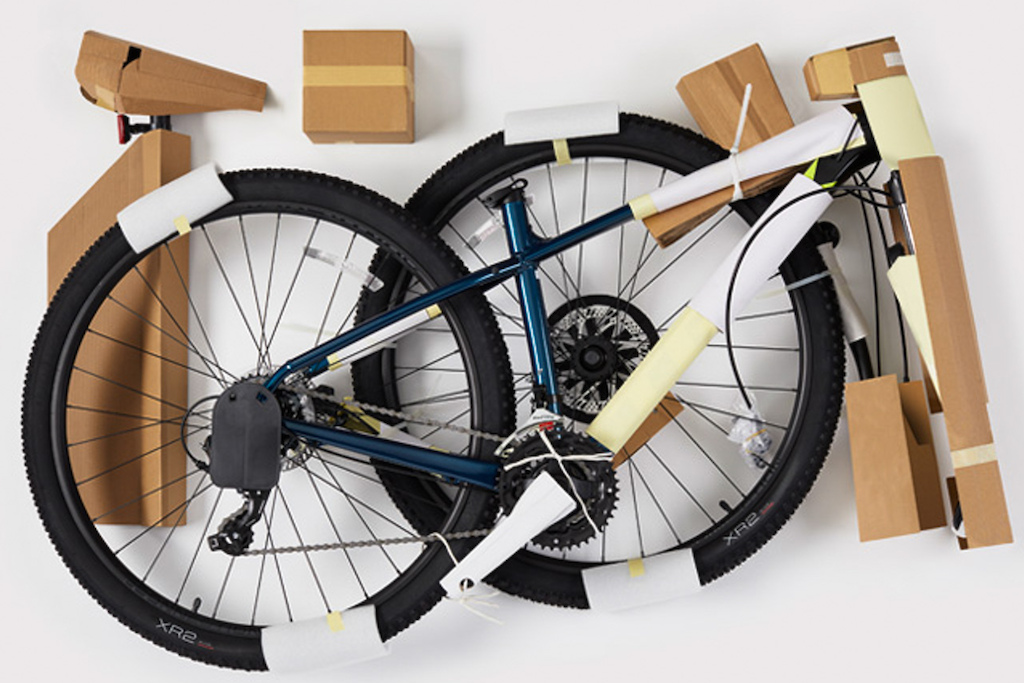5 Environmental Initiatives in the Bike Industry: Trek Removes 433,600lbs of Plastic, Sustainable Manufacturing, & More
The cycling industry gets away with some pretty wasteful practices, which it often waves away under the pretense of "it's bikes, so it's green." The reality is that buying less, repairing and reusing your things, and riding more locally are the best things for the earth; however, we applaud the brands that are trying to reduce their impacts on the environment too. The perfect is the enemy of the good, so it's great to see people working towards better.
Let's take a look at the recent announcements that move the industry forward in reducing its impact on the environment.
Trek Drops 433,600 lbs of Plastic from Packaging
Trek has announced that it has found ways to remove 433,600 lbs of plastic packaging as it reviews the process of sending out its bikes.
We reported last year the first steps Trek had taken towards removing plastic, but it now appears that they have taken this a step further and dropped an incredible amount of plastic from its supply chain. Trek currently plans to remove all plastic from its packaging by 2024 and this is a huge milestone on its journey to that goal.
A breakdown of the plastic removed shows that the Marlin, Verve and other more entry-level adult bikes have seen the biggest amount of plastic removed with 246,000 lbs. Top-level bikes like the Supercaliber have seen a smaller reduction of 40,000 lbs, but this is more likely due to a potential lower volume of these bikes being sold than fewer reductions being made in the packaging.
- 246,000 lbs removed from Marlin, Verve, and other entry-level adult bikes
- 65,400 lbs removed from electric bikes: Rail, Powerfly, Allant, and Electra Townie Go!
- 58,000 lbs removed from kid’s bikes (including Kickster, Precaliber)
- 40,000 lbs removed from Madone, Supercaliber, and other high-level adult bikes
- 12,600 lbs removed from Electra Townie 7 and 9
Looking at its current packaging, Trek wanted to find the areas featuring the highest amounts of plastic and target these first by asking what purpose it served and whether it could be simply swapped for cardboard or paper. With this idea in mind, Trek could remove the down tube, top tube, seat tube and head tube foam, and plastic wrapping.
Trek does say that it was not always easy to remove plastic from its packaging, and in some areas, it was necessary to stick with a plastic option but one that can be reused or recycled. Examples of this include replacing plastic wrapping of smaller components with reusable Ziploc bags. While Trek is ahead of most of the industry in this area, the brand is still behind Cannondale, who has already created a full cardboard packaging system with zero plastic.
Pearl Izumi Starts 'Pedal to Zero' Initiative to Balance Out the Impact of Garments
Pearl Izumi is publishing the stats about the number of miles needed to ride a bike, instead of driving a car, to offset the carbon impact of each of its garments.
Every garment in Pearl Izumi's new BikeSyle Spring 2022 collection will feature the stats using the Higg Product Module to determine the amount of carbon dioxide created in the manufacturing of each garment. Using an estimate that a standard car will produce 404 grams of CO2 per mile, Pearl Izumi can then calculate how much a rider will need to use their bike to balance out the creation of their clothing.
Pearl Izumi provides the example that its Rove Short takes 5.9kg of CO2 to make and ship to the US, this would then need the rider to swap their car for the bike for 15 miles to counteract its impact on the planet.
The new 'Pedal to Zero' initiative is part of Pearl Izumi's goal to become net positive by 2025. Back in 2018, the brand announced its target to have 90% of the clothing range be sustainable. Currently, this sits at 40% with products featuring recycled, renewable, and organic fibers.
Hutchinson Begins Using New Manufacturing Technique to Increase Sustainability of its Tires
Hutchinson has developed a new tire reinforcement technology that claims to significantly reduce the environmental impact of manufacturing.
The new technology called Gridskin uses a knitted mesh style construction providing greater tire protection. It is designed to isolate damage and prevent any sharp object from creating punctures or larger holes. Using the new tech, Hutchinson claims the processing steps in creating a tire with this level of protection is dropped from four to one. A result of the easier manufacturing is less waste and fewer emissions by using a reduced amount of plastic, rubber and electricity. Hutchinson was inspired to research new technologies as it believes "tyres account for a sizeable amount of waste from both the cycling industry during production; and by the consumer, once the tyre has reached the end of its lifetime."
Currently, Hutchinson is offering this technology in two limited edition tires for road and gravel bikes, and they come with packaging made from recycled paper. There is no news on how this technology will be added to Hutchinson's full tire range, but it is worth noting that while the Gridskin may extend the life of the tire and lower the impact of manufacturing, it does not solve the big issue of how to dispose of tires once they can no longer be used.
Polartec Removes PFAS in its Major Products
Polartec has revealed it is completely removing all PFAS in its DWR clothing treatments on its complete range of fabrics.
Polartec was previously among the many brands using the group of chemical substances called PFAS in the water repellent treatments used for its clothing ranges. Now, Polartec has found a way to create a DWR treatment without these dangerous chemicals and it is claimed to have zero loss of durability or water repellency.
PFAS have been referred to as "forever chemicals" because they are extremely hard to remove, and some form of PFAS can take over 1000 years to fully degrade. The family of chemicals has been known to cause harm to both humans and wildlife and currently it is believed that all PFAS ever made are still out in the environment.
Trash Free Trails Partners with Forestry England to Encourage People to Leave No Trace
Author Info:
Must Read This Week
[UPDATED] Final Elite XC Results & Overall Standings from the Mairiporã XC World Cup 2024
42348 views
42348 views
Sign Up for the Pinkbike Newsletter - All the Biggest, Most Interesting Stories in your Inbox
PB Newsletter Signup





.....And other reasons you can look into if you like. I was impressed that Trek chose a brand that originated in North Van (and still does some MFG there) and is still very high-quality (although now owned by Chinese!) for their team. Kade is always wearing the stuff.
Following current trends and appealing to hipster eco/craft beer snobs!
I would also like to see a return bin at the LBS or something for reflectors and "dork discs" that are removed by a majority bike riders. If I can opt out of the safety equipment that's legally required to be on the bike when I purchase it, at least make them removable without destroying them and let me have the opportunity to not toss it straight into trash.
Guessing all of the downvotes are from people who have never seen their staff wasting time while on a fixed-price job.
Edit:
@bigtim There must be something to it if you were shown at a bike shop. I’m surprised. *shrug*
Cut the tire to fit around your chain stay. Zip tie it with the used ties and presto! A silent chain slap…
There are arguements for and against plastic Vs paper
Pro paper/against plastic:
Paper is from a "renewable source"
Paper can be recycled more times over than plastic
Paper is more widely recycled that plastic
Paper looks more sustainable
Pro plastic/against paper
Paper takes many more times the amount of energy to produce compared to plastic
Paper requires an insane amount of water in its production, often being produced in countries which have limited access to clean water
Around 2.47 million trees are cut down every single day
As you can see neither is a good solution and personally I can't decide which is worse.
If you look on almost any paper product you buy, it will have a little logo on that says FSC. This allows you the consumer to trace the origin of the paper. Often it will day FSC mix. This means a mix of virgin wood pulp and some recycled content. Usually the recycled content is very low, maybe 10-15% but this may vary mill to mill. Based on this and the shear number of trees cut down every year (900 million) there's a compelling argument to use recycled plastics.
Recycled plastics on the surface are more sustainable than paper, especially 100% virgin paper. However there are complexities that run deep such as the recycling system in each country that would make this reply way to long.
Basically what my point is, while it may be a positive change in one view, it's negative in another. The biggest issue today is that nobody knows what is better and the common belief is that paper is best but most people are not looking at this through informed eyes but rather what is the common belief of what MUST be better. So always take this sort of thing with a pinch of salt and really it's down to us to improve how we dispose of stuff and what we ask our governments to do.
I work for a company which sells "sustainable" packaging and other items and I can tell you all for sure that 90% of the clothing companies of this world don't actually care about their environmental footprint, they just want it to look pretty for marketing so they aren't left behind. And we as consumers buy into the narrative without being educated or taking the time to look into it.
To summarize:. Don't trust anything a large corporation says without diving deeper to get an understanding.
There's so much to this argument it's ridiculous. Essentially the whole system of sustainability is flawed. And it won't change until governments implement better in country recycling. Every levy/tax etc. Is but a sticking plaster.
Oh one last thing to add. It may be shocking to find out that only around 25% of all waste in the US is recycled which is utter madness.
We're at a strange time right now where some of these perceived "better" ways of doing things might cause as much damage, so I think it's important that we push governments and companies to make decisions that are actually beneficial, not just perceived as such.
Next you’ll be telling me that when the bike industry tells us we “must get the latest 2022 model of that bike we own, because this new one will make us rider even better!”- it’s all a lie?!…………….
All jokes aside, yes- a marketing team promoting a “ greener profile” for a company is nothing short of a PR stunt.
Pro’s and Con’s are rife in this field and just like batteries in electric cars, bikes, personal devices, homes etc; there is always an environmentally impactful skeleton behind the curtain.
Arguably, you could get the industry to sell bikes on a single sized cardboard box, where the bike is completely built! At the LBS- they just role it out to the consumer and send the box back to restock/reuse.
This won’t ever happen because, the size of the box would dictate a lesser capacity on logistical movement plans and end up using more fuel in more vehicles to dispatch.
It’s all about a weigh off of PROFITS versus ECONOMY OF EFFORT.
IF the industry really wants to save the environment, stop changing frame/component colour ways every year and hold the same colour ways for that evolution of the model.
Less people will then feel inclined to repurchase the same bike with a different spray job and slightly altered spec sheet components.
However I would have to state that pulpmills in Canada definitely operate under a different set of standards than mills in other countries.
I'm just making this point because the buy local argument can sometimes be bad advice from a climate perspective because of this efficiency. For example, in the UK it's usually less CO2-emitting to ship tomatoes from Spain than to grow them in the UK, where they often need to heat the greenhouses.
You're right about ships creating a lot of smog air pollution though, which is a problem when they sail near built-up areas.
Sources:
ourworldindata.org/co2-emissions-from-transport
www.youtube.com/watch?v=WWiX2edcBoA
www.youtube.com/watch?v=mmNcOCwtFeg
Microplastics are a big issue but the cause of them runs deep. The system is reliant on people taking care to recycle which most decent people do, at least in this country. The issue though is the system is completely broken. Theres maybe 2-3 different types of disposable plastics used in bike packaging, PP, LDPE and ABS plastic. The first 2 can easily be recycled, ABS less so as far as i understand.
My original argument is as such that if the plastics were recycled properly, those PP and LDPE products would be returned back into the system in a similar form meaning less oil is required in the production. This process is many times more efficient and "sustainable" than using paper. So on the surface, using recycled plastic products is more sustainable. For example I recently brought on a client for using recycled plastic products removing approximately 780 tons of virgin plastic from their supply chain. Were this to be paper products, the environmental impact, at least in the production stage is considerably worse.
The challenge comes about in the recycling stage. Basically recycling is broken. 45% of waste in the UK is "recycled" but studies show that maybe only 20% of it is actually recycled, the rest is burnt. We send our plastic waste to the far east. China stopped accepting the worlds plastic in 2018 so instead we send it to Malaysia who then use what they can to turn into new raw material and then do who knows what with the rest as they get way more than they can handle. Thats before they even start to deal with their plastic.
My belief is the system will continue to be broken until the people lobby for their governments to improve infrastructure in their own countries. I dont know that we have any facility at all in the UK for recycling plastic. It is actually a huge opportunity for the government. In the North East of England we have a place called Redcar where there used to be a huge steel factory which has closed down which left thousands jobless. There is now 100s of acres of empty factory space which would be available for pennies on the pound which is just begging to be turned into a plastic recycling plant to convert plastic waste into raw material which could then be sold to manufacturers. There was a brief recycled plastic shortage earlier this year which inflated prices by 30% so its not like its a flooded market. It would be a huge investment opportunity to revitalize an area, employ 1000s which are not currently employed and bring manufacturing back in country. The same could be said for many western countries. This could fix the issue but it wont happen without lobbying. The only country I have heard of which is taking this approach is Australia.
in short, the whole thing is extremely complex and the governments especially arent doing the right things and are focusing on the wrong things.
I know that in a perfect world everybody would be recycling, but that's hardly the case, and in my opinion when legislating one must think also about all the "bad apples"..
I think the way forward is to have less and less plastic, only when really necessary and especially not in disposable products, packaging etc. One clear example we have in EU is plastic bags (and soon enough plastic cutlery), everybody was ranting for a while but now nobody cares and I've seen less and less plastig bag laying in the environment...
In basic terms, there appears to be no perfect solution and whether paper or plastic is better is very much open for interpretation/debate
But to your specific point - ebike commuting is a pretty clear win for the planet over car commuting, as you stipulate. I see where you're coming from on the purely recreational nature of e-MTB - it's not "necessary" to mountain bike, so e-MTB would have a higher footprint that regular MTB, and that's a bad thing. But I think the important thing to look at is what it replaces. There are a bunch of places I've seen people ride e-MTBs instead of shuttling. That's a win. Or folks riding their e-MTB all the way to the trails and then riding the trails - as opposed to driving their cars to the trailhead to go ride - also a win. I've also met folks who got into e-MTBs instead of riding their motorcycles (clear win) or playing golf (really clear win, as golf courses are a serious environmental issue). So I don't think it's as clear cut as saying it's out of laziness and therefore e-MTB is a bad thing environmentally.
Rather than skimming off a mill or two in a lathe, new ones are produced in Asia and travel across the globe, while the old ones are sent the other way for recycling.
Arghh! These things make me want to toss worn rotors at every politician I see.
Just imagine what it takes to produce, ship and recycle two rotors, all made in china. This is somehow cheaper than bolting hem up in a lathe for 5 minutes.
Keep up the work, it's well appreciated and noticed by a lot of us consumers
Glad to see that Trek is working on it. Pleasantly surprised that C'dale got rid of it already (their bikes 5 years ago shipped with so much trash in the box).
This is akin to BP or Shell saying they will reduce their impact by telling people to not drive their car. Complete BS and another example of companies wanting the customers to make sacrifices instead of leading the way.
@pockets-the-coyote, spot on there, those parts should be a “no cost” option
The biggest step for sustainability and customers would be to finally settle on one standard. I don't want to know how many bikesparts get bought and then directly land in a box for the next 10 years before getting transfered to the bin, just because it was the wrong standard.
But aslong as "traditional" resins are used, you can't recycle it.
And no, for me "energetic recycling" isn't recycling....
But does someone know what they use at Guerilla Gravity?
GG:
"With Revved, the drop material can simply be reheated and reformed into a new part without chemically stripping and re-adding resin." (Matt Giaraffa, GG Chief Engr ) www.vitalmtb.com/news/press-release/Revved-Industries-Secures-First-Patent-for-Revved-Carbon-Manufacturing,4327
Revel:
"We use the same original carbon fibers, but instead of traditional epoxy use, we use a nylon polymer... And our particular nylon polymer blend is proprietary for what we're using it for in the bike industry,” (Adam Miller, on Revel’s Fusion-Fiber) www.curated.com/journal/33002/shift-to-sustainability-revel-bikes-and-guerrilla-gravity-push-eco-friendly-manufacturing
This is a good overall read:
grist.org/living/what-is-the-greenest-type-of-bike-frame
Interestingly enough, chains produce more solid waste per-pound than do aluminum or carbon fiber frames, by far. (Duke study: dukespace.lib.duke.edu/dspace/bitstream/handle/10161/8483/Duke_MP_Published.pdf)
The problem is that recycling is an extremely complicated topic and there is no easy answer for what is better. In my personal opinion people should work a whole lot more on the reducing and reusing of things rather then the recycling. Unfortunately, that doesn't allow people to buy lots of stuff without feeling guilty because they recycle.
I wholeheartedly agree on the consumption reduction point. We need to figure out how to use our stuff for longer, repair, modify, and design adjustability into the product. Recent geo-adjustable frames have done an ok job, Nicolai being the best with their mutator system.
Imagine being able to pick product A over product B not because it’s 100g lighter/stiffer/more compliant, but because it’s lifetime carbon footprint is significantly smaller. That would give me a warm feeling inside.
I’d guess it’d need an independent auditor to check the manufacturing process/shipping etc, but would be something I’d pay more to see.
If you want to be eco then go buy an local manufactured steel hardtail with high durability components ( not the lightest) and just ride it for fun.
iXS doing good things.
(You know you were thinking it too.)